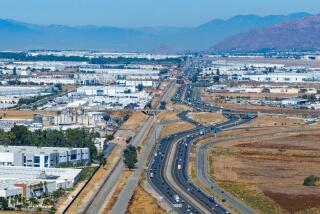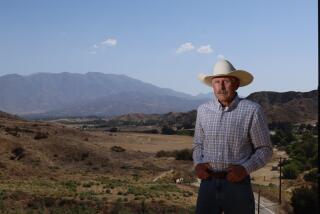Marines Consider Relocating Arizona Bomb Storage to Neighboring Farmland
YUMA, Ariz. â A series of gray cement mounds sprouts from the sandy southern edge of the Marine Corps Air Station here, silently housing bombs.
For generations, the bunkers have sat in the shadows of the boxy air station housing. But now the Marines say itâs time to move the bunkers to make the air station safer and to keep it from being targeted for closure.
They want the bombs moved to alfalfa and citrus fields directly south of their existing location--a plan that has some farmers up in arms and threatens to pit two of this communityâs biggest industries against each other.
âWhat they are doing to us is basically taking away our rights to do what we want with our property,â said Bill Waltrip, a 75-year-old farmer whose land is being eyed by the military. âIf the Marine Corps Air Station wants this property, they should pay fair market and not what they say is fair market.â
The Marine Corps began looking for a new spot to move its ordnance in March 1996, after years of operating under a waiver that allows the bombs and housing to sit too close together. Some houses are within 100 feet of the area that would likely be damaged in an unexpected explosion.
The air station also has a waiver allowing ammunition to be loaded onto attack helicopters in a special area during February and March, because it hosts training sessions for flight instructors, doubling the usual number of flights per day.
âThey donât come here just to fly,â said Col. Craig J. Turner, the air station commander. âThey come here for a reason. Thatâs to deploy and go drop ordnance.â
But the waivers will not automatically be renewed, and if theyâre not, it could threaten the air stationâs existence.
What the Marines hope to do is purchase a 1,641-acre plot to the south of the air station. There, they would build new bunkers, add a larger ammunition loading area and build a larger fire station.
Turner said the plan, which is subject to approval by the Secretary of the Navy, would eliminate the need for waivers and decrease the number of ammo trucks coming and going from the air station. Because there is only limited space in the existing bunkers, most trucks come in only half-full, requiring more frequent deliveries along public streets.
Mark Spencer, whose family farms part of the property the military is interested in, said the government already owns the vast majority of the land in Yuma County and points out that the military has a huge bombing range just miles from the air station.
He and Waltrip both said the military should move its ordnance there.
Using the Barry M. Goldwater Range to store the bombs is among the alternatives the Marines are considering, but Turner said its major drawback is that it would force the military to truck bombs along seven miles of public roads to the loading area.
No one in this community, which already has roughly 30% unemployment, wants to see the air station disappear. It represents a $205.7-million economic impact to the community, according to the Greater Yuma Economic Development Council. Agriculture, Yumaâs economic titan, generates $630 million.
âWe want to protect that base. We are very, very pro-military,â said Yuma Mayor Marilyn Young. âWe cannot afford to be without that Marine base there.â
But some farmers have owned the land the military wants since the 1950s. Much of it was given by lottery to World War II veterans.
Waltrip was one of the those farmers. He has worked the land since 1955, living and raising three children in a homestead he built near the patch the military wants.
âIf weâve got something theyâve got to have and itâs our livelihood, then I think they should compensate me for it,â he said, as Harrier jets roared overhead.
Waltrip wants the military to pay him enough to replace the land he is losing, not just the market value. Thatâs because Waltrip sits under the air stationâs flight path, which decreases the landâs value.
Spencer said he and other farmers in the area are outnumbered in their fight to keep their land.
The local government and businesses who depend on the air station fully support what the Marines want to do, he said.
âI canât blame them for that,â said Spencer, whose father came to Yuma in the 1940s to farm. âWe have very little political impact because there [are] so few of us.â
For years, the Marines have been eyeing the 1,641 acres held by 11 owners, discouraging other potential buyers, he said.
âItâs tantamount to them taking an option on the land without paying for it,â Spencer said. âThe military is supposed to be here to protect, not take our land.â
More to Read
Sign up for Essential California
The most important California stories and recommendations in your inbox every morning.
You may occasionally receive promotional content from the Los Angeles Times.










